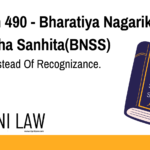Code: Section 97 – Bharatiya Sakshya Adhiniyam, 2023
When language used in a document is plain in itself, and when it applies accurately
to existing facts, evidence may not be given to show that it was not meant to apply to such
facts.Illustration.
A sells to B, by deed, “my estate at Rampur containing one hundred bighas”. A has an
estate at Rampur containing one hundred bighas. Evidence may not be given of the fact
that the estate meant to be sold was one situated at a different place and of a different size.
Explanation of Section 97 BSA
Section 97 of the Bharatiya Sakshya Adhiniyam reinforces the principle that when the language of a document is clear and fits perfectly with known facts, no additional evidence is permitted to change the meaning or suggest a different intent.
This provision ensures that courts honor the objective and plain meaning of contractual or legal language without being influenced by subjective intentions or afterthoughts.
Purpose:
To uphold the certainty of written documents and prevent the distortion of clear contractual terms by introducing contradictory oral evidence.
Illustration
-
Example: A deed of sale says “my estate at Rampur containing one hundred bighas.” A indeed owns an estate matching that exact description. In such a case, A cannot later argue that a different estate was meant. The language matches the facts, and thus, no contradiction is permissible through oral or extrinsic evidence.
Common Questions and Answers on Section 97 BSA
Q1. What does this section prohibit?
It prohibits the admission of evidence to suggest that the plain language of a document, which fits existing facts exactly, was intended to apply to something else.
Q2. How is this different from Section 96?
While Section 96 deals with documents that are ambiguous or defective on their face, Section 97 applies when the language is clear and unambiguous but a party claims it wasn’t meant to apply to the obvious facts.
Q3. Can a party claim a different intention if the document is clear?
No. If the document’s language is plain and accurately describes existing facts, no evidence can be admitted to suggest an alternative intention.
Q4. What if both parties misunderstood the facts?
Unless the misunderstanding falls under exceptions like mutual mistake or fraud (as addressed in Section 95), such a claim won’t be entertained under Section 97.
Conclusion
Section 97 BSA promotes legal clarity by ensuring that documents are interpreted according to their plain language when that language matches real-world facts. It prevents unnecessary litigation over subjective intentions and keeps the focus on the written word, maintaining the integrity of documented agreements.
Let me know if you’d like an HTML version of this for your ApniLaw website or if you’re ready to proceed to the next section.









